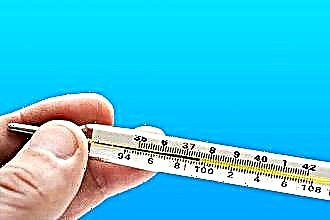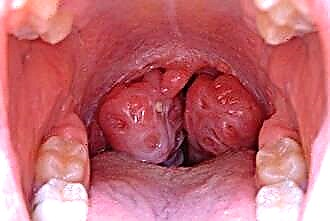It should be noted that dryness in the nose is not only unpleasant, but also very harmful. Nasal mucus is normally constantly produced by the cells of the mucous membrane (after all, this is why it has such a name), which is necessary for humidifying and purifying the air, as well as suppressing the activity of microorganisms that enter the nose with inhaled air.
Thus, excessive dryness in the nose significantly increases the risk of developing various infectious diseases of the nasopharynx..
How to treat dry nose for an adult? What drugs are best used for this purpose? Read about it in this article.
Possible causes of dryness
 Dryness in the nose can be either an independent disorder or a symptom of more complex systemic diseases. So, dry nose can have the following reasons:
Dryness in the nose can be either an independent disorder or a symptom of more complex systemic diseases. So, dry nose can have the following reasons:
- Low air humidity. The most harmless reason, since it is solely due to external conditions.
- Lack of fluid in the body, dehydration.
- Dry rhinitis. A disease in which the mucous membrane becomes dehydrated and thinned; dry crusts form in the nose, often with impurities of dried blood.
- Hormonal changes - pregnancy, menopause.
- Abuse of vasoconstrictor nasal drugs (such as Naphthyzin, Otrivin, which are used for congestion).
- Side effects of certain medications (in particular, hormonal drugs, antihistamines and non-steroidal anti-inflammatory drugs).
- Diabetes. In this disease, fluid is retained in the blood, causing the tissues to become dehydrated. For the same reason, patients with diabetes mellitus notice itching in the ear canals, and are constantly thirsty.
- Pathology of the glands of external secretion (in this case, the patient produces an insufficient amount of saliva, mucus in the nose, he sweats a little).
Dryness in the nose can be both a reaction to unfavorable environmental conditions and a sign of severe metabolic disorders.
Treatment
Usually, the treatment of excessive dryness begins with topical preparations - drops, sprays, ointments, etc. These drugs act symptomatically - they reduce dryness by acting directly on the mucous membrane. In most cases, this approach gives good results - the work of the mucous membrane is normalized, and in the future a person can do without drugs.
Moisturizing drops
How to moisturize the nasal mucosa? First of all, you will need moisturizing saline-based nasal drops.
Moisturizing nasal drops are a group of paramedical drugs used to treat many diseases of the nasopharynx, as well as to care for the nasal cavity. Moisturizing drops contain only water and salt. Many of them are created on the basis of sterilized and isotonic seawater.
Plasma isotonia is one of the most important properties of moisturizing drops. Due to isotonia, such drops do not pull water towards themselves - this would lead to drying of the mucous membrane, but they are not absorbed into the cells, causing them to swell.
 As you know, the simplest isotonic solution is physiological saline (or simply "saline"). Indeed, saline is actively used as an analogue of drops based on seawater. In fact, both are 0.9% edible salt solution. You can even make such a solution yourself - fortunately, the components are very affordable. Just dissolve 9 grams of salt in 1000 ml of water (0.9% concentration is obtained). You should not increase the proportion of salt - you will get a salty solution, irritating and drying out the mucous membrane.
As you know, the simplest isotonic solution is physiological saline (or simply "saline"). Indeed, saline is actively used as an analogue of drops based on seawater. In fact, both are 0.9% edible salt solution. You can even make such a solution yourself - fortunately, the components are very affordable. Just dissolve 9 grams of salt in 1000 ml of water (0.9% concentration is obtained). You should not increase the proportion of salt - you will get a salty solution, irritating and drying out the mucous membrane.
Ready-made saline can be purchased at a pharmacy; the advantage of such a solution will be its sterility and the absence of any impurities. As for pharmaceutical nasal drops and aerosols based on seawater, their undeniable advantage is a convenient bottle that sprays the solution over the entire nasal cavity. Moreover, such drops and sprays can hardly be called affordable, especially if we take into account their simplest composition. The most popular drugs in this group are Aqua Maris, Salin, AquaLor, Aqua Master.
How can a saline solution help with dry mucous membranes? Such a solution:
- liquefies viscous mucus clots;
- softens the crust;
- simulating physiological nasal mucus, facilitates nasal breathing;
- eliminates dust and other microparticles deposited on the mucous membrane;
- normalizes the work of mucus-secreting goblet cells;
- stimulates the movement of ciliated cells, which play an essential role in the self-cleaning of the nose.
How to use saline drops and sprays? The drugs in this group do not cause side effects and are not addictive, so there are no restrictions on their use.
You can bury your nose with saline as often as needed to make you feel better.
Oils
To moisturize the nasal mucosa, both pure oils and nasal drops based on them are used. Among the oils are olive, peach, sea buckthorn. Other neutral oils (flaxseed, sesame, etc.) can be used, but not essential oils - they are not suitable for this purpose, and can be harmful if they are instilled in undiluted form. Among pharmaceutical preparations based on oils, Pinosol, Neonox, Sinumiks are very popular.
Oil and preparations based on it are a wonderful remedy in the fight against drying out of the mucous membrane. The effect of such funds is felt immediately after application.
For this reason, many people with dryness are addicted to oils. For example, you can often hear "I smear the nasal cavity with oil every day before going to bed - otherwise I can not sleep." But can oil solutions be used on a regular basis? Can they harm the mucous membrane?
Let's see how such drugs work. The oil contained in the product envelops the nasal cavity in a thin film, preventing the evaporation of moisture from the mucous membrane. In addition, the oiled epithelium becomes more elastic, and dry crusts soften and come off more easily. All this leads to a noticeable improvement in nasal breathing and the disappearance of itching, burning and dryness.
The negative effect of oil drops is that the oil disrupts the work of the ciliated epithelium, namely, it impedes the movement of the cilia.
Indeed, cilia cannot normally vibrate in oil, because its density is significantly different from the density of physiological mucus. Over time, they become inactive. In turn, this can lead to the inability of the nasal cavity to cleanse itself of dust, microorganisms and mucous secretions. This threatens with weak resistance to infectious diseases and their severe course in the future.
What conclusions follow from this? First, the oil is an effective and fast-acting remedy for dry nose. Secondly, oils should be used sparingly, only when they are severely dry, not forgetting about the possible negative effects.
Ointments
 Another remedy for dry nose is nasal ointment.Almost all nasal ointments and creams contain oil or petroleum jelly, which coats the mucous membrane. Thus, their effect is much the same as that of plain oil. In this case, different ointments may contain additional active substances with different effects - anti-inflammatory, antiseptic, emollient, etc., depending on the drug.
Another remedy for dry nose is nasal ointment.Almost all nasal ointments and creams contain oil or petroleum jelly, which coats the mucous membrane. Thus, their effect is much the same as that of plain oil. In this case, different ointments may contain additional active substances with different effects - anti-inflammatory, antiseptic, emollient, etc., depending on the drug.
With dryness, the inner walls of the nose can be smeared with ointments such as:
- Lanolin ointment - has a nourishing and softening effect, prevents the formation of crusts.
- Pinosol - moisturizes and kills microorganisms.
- Ointment for dry nose "Propolis" MosFarma.
- Evamethol is a petroleum jelly-based moisturizing ointment that also contains eucalyptus oil and menthol.
- Nizita is an ointment based on petroleum jelly, contains mineral additives.
It is worth noting that many ointments for dry nose are not drugs, so you should consult your doctor before using them.
Dryness aids
We told you what medications you can use to moisturize the nasal mucosa. It should be remembered that in order to achieve a long-term result, you need to not only moisturize your nose with drops and ointments, but also change some of your habits to healthier ones. In particular, during treatment, you should adhere to the following rules:
- drink plenty of fluids;
- avoiding too sweet foods, caffeinated drinks;
- consume a sufficient amount of vegetable oils;
- maintain normal humidity in the house (above 55% is recommended);
- do wet cleaning often;
- walk in the fresh air every day.
If local therapy does not lead to improvement, the patient should be examined - there are probably internal causes of the dry nose. In this case, general treatment will be required, aimed at eliminating the underlying disease, and moisturizing the nasal mucosa with drops and ointments will play the role of auxiliary therapy.



